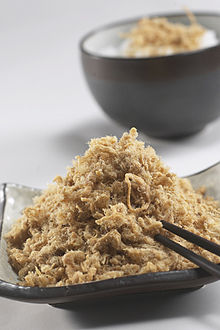- Rousong
-
Rousong 
Chinese name Traditional Chinese 肉鬆 Simplified Chinese 肉松 Hanyu Pinyin ròusōng Literal meaning meat fluff/loose Transcriptions Mandarin - Hanyu Pinyin ròusōng Wu - Romanization [ɲiɔʔ soŋ] Cantonese (Yue) - Jyutping juk6 sung1 Rousu Chinese 肉酥 Transcriptions Mandarin - Hanyu Pinyin ròusū Min - Hokkien POJ bah-so· Cantonese (Yue) - Jyutping juk6 sou1 Indonesian name Indonesian abon Thai name RTGS moo yong Vietnamese name Vietnamese ruốc (Northern Vietnamese) or chà bông (Southern Vietnamese) Rousong (肉鬆), also sometimes called meat wool, meat floss, pork floss, pork sung, is a dried meat product that has a light and fluffy texture similar to coarse cotton, originating from Fujian.[1] Rousong is used as a topping for many foods such as congee, tofu, and savory soy milk. It is also used as filling for various buns and pastries, and as a snack food on its own. Rousong is a very popular food item in Chinese culture, as evidenced by its ubiquitous use in Chinese cuisine.
Contents
Production
Rousong is made by stewing cuts of pork in a sweetened soy sauce mixture until individual muscle fibres can be easily teased apart with a fork. This usually happens when the collagen and elastin that normally hold the fibres have been cooked out of the meat.[citation needed] The teased-apart meat is then strained and dried in the oven. After a light drying, the meat is mashed and beaten while being dry cooked in a large wok until it is completely dry. Additional flavourings are usually added while the mixture is being dry fried. 5 kg (11 lb) of meat will usually yield about 1 kg (2.2 lb).[citation needed]
Pork-less versions
Fish can also be made into floss (魚鬆; yú sōng) though initial stewing is not required due to the low collagen and elastin content of fish meat.
In Muslim majority Indonesia, beef floss is the most popular variant and meat floss are commonly called abon. Another variant is fish floss. Malaysian Muslims make and consume meat floss made from chicken or beef called serunding, which is a popular delicacy during Ramadan and Hari Raya Aidilfitri.[2]
Other versions
A very similar product is pork fu (肉脯; pinyin: ròu fǔ; POJ: bah-hú), which is less fried and less shredded than rousong, and has a more fibrous texture.
Notable brands
North America
- Formosa Pork Sung (寶島)
- Kimbo Brand Pork Sung
- Soo Singapore Jerky
Malaysia
- Loong Kee ("Long Gei")
- Wing Heong
- Kiew Brothers ("Wo lai Yeh")
- Chun Me Food Trading ("xin quan mei")
- Bee Cheng Hiang (Měi Zhēn Xiāng)
- Muar Yuen Chen Siang
Singapore
- Bee Cheng Hiang (Měi Zhēn Xiāng)
- Fragrance Foodstuff (香味 Xiāng Wèi)
- Lim Chee Guan (林志源;Lín Zhì Yuán)
- Tan Chee Yuan (Chén Zhì Yuán)
- New Peng Hiang (Xīn Pǐn Xiāng)
Indonesia
- Abon Ratu (beef floss)
- Abon Ratu Mawar (beef floss)
- Abon Gloria (beef floss)
Taiwan
- Jin Xiang Yuan
- Chuan Xiang
- Hsin Tung Yang
Philippines
- Bee Tin
- Lord Stow's Bakery
See also
References
- ^ Grigson, Jane (1985-01), World Atlas of Food, Bookthrift Company, ISBN 978-0671072117
- ^ Thestar.com. "Thestar.com." Mum’s meat floss legacy. Retrieved on 2008-09-19.
 Macanese cuisineAlmond biscuit · Bacalhau · Bakkwa · Cabidela · Dried shredded squid · Galinha à Africana · Galinha à Portuguesa · Mango pudding · Minchi · Pastel de nata · Pork chop bun · Portuguese sauce · Rousong
Macanese cuisineAlmond biscuit · Bacalhau · Bakkwa · Cabidela · Dried shredded squid · Galinha à Africana · Galinha à Portuguesa · Mango pudding · Minchi · Pastel de nata · Pork chop bun · Portuguese sauce · RousongTaiwanese cuisine Dishes and meals Bento • Congee • Geng • Karasumi • Misua • Mongolian barbecue • Oyster vermicelli • Pork ball • Rice vermicelli • Sanbeiji • Shabu-shabu • Tilapia (braised) • Ying Yang fish
Xiaochi Snacks and desserts Aiyu jelly • Baobing • Bakkwa • Caozai Guo • Coconut bar • Douhua • Dried shredded squid • Grass jelly • Mochi • Mooncake • Onigiri • Suncake • Yōkan • YoutiaoBeverages Bubble tea • Dong Ding tea • High mountain tea • Kaoliang • Mr. Brown Coffee • Pouchong • Soy milk • Taiwan BeerIngredients Miscellaneous
Wikimedia Foundation. 2010.

